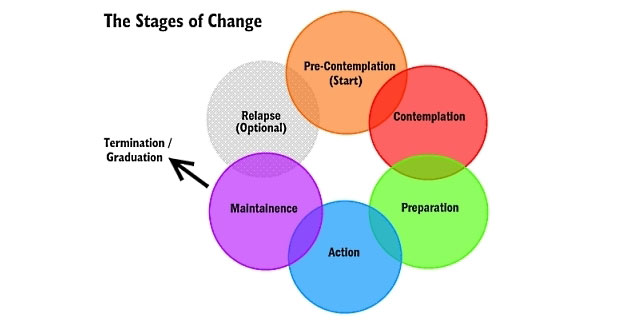What to Expect
- Home
- Treatment & Recovery
- Recovery
- What to Expect
Recovery from addiction is typically a long, non-linear process. The stages of change theory suggest that anyone who is making a major lifestyle change–from quitting smoking to losing weight to recovering from opioid addiction–typically goes through several distinct phases of thought and behavior before they are able to make lasting change. SMART Recovery offers a helpful overview of the stages of change:
-
Pre-contemplation:
Pre-contemplators usually show up in therapy because of pressures from others, such as spouses, employers, parents, and courts. They tend to RESIST CHANGE.
-
Contemplation:
Contemplators acknowledge that they have a problem and begin to think about solving it. Contemplators struggle to understand their problems, to see its causes, and wonder about possible solutions. Many contemplators have indefinite plans to take action within the next few months.
-
Preparation:
Most people in the preparation stage are planning to take action and are making the final adjustments before they begin to change their behavior–but they probably have not yet resolved their AMBIVALENCE. They will still need a little convincing.
-
Action:
This is the stage in which people overtly modify their behavior and their surroundings. In the case of addiction, this often involves formal treatment and/or support groups. This stage requires the greatest commitment of time and energy. CHANGE IS MORE VISIBLE TO OTHERS.
-
Maintenance:
In maintenance, people gain more time without their substance use featuring prominently in their lives. For many people, this requires total abstinence from substances, while for others, they are able to maintain a healthier lifestyle without complete abstinence. Maintenance often involves relapse, which usually returns them to a precontemplation or contemplation stage.

People who use substances will often move in and out of the stages of change in their journey towards recovery, sometimes moving towards readiness to make change and then slipping back and away from change. Most people who attain some sustained recovery go through the stages three or four times before they make it through the cycle of change without at least one ‘slip,’ also known as relapse. It is important to remember that addiction is driven by both biological and environmental factors with complex connections to a person’s sense of self and to their relationships with other people, so it can take time and many tries at recovery before someone gets into a sustained period of recovery. But millions of people get into recovery each year, so there is hope!
It can be helpful to family members and friends to learn more about the nature of addiction and the stages of change so that they can begin to recognize and encourage any forward movement through the stages of change. Although most families understandably want their loved one to stop using substances as soon as possible, they ultimately do not have control over their loved one’s behavior, so recognizing even small steps of progress can be rewarding for the individual with the substance use disorder and can help the family in remaining more hopeful.
The CRAFT (Community Reinforcement and Family Training) model is an evidence-based method that has been shown to help families learn strategies to help themselves manage their own emotions during the turbulence of a loved one’s substance use disorder while also encouraging change in their loved one. To learn more about this model and how to implement its principles, you can talk to other parents from the Partnership for Drug-Free Kids parent helpline or create an online account at Allies in Recovery (MA residents can create a free account by entering their zip code as the promo code).